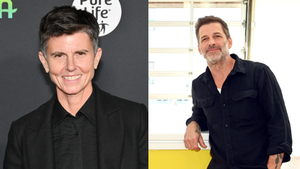Treatment GuideJust DiagnosedSex & DatingAfrican AmericanStigmaAsk the HIV DocPrEP En EspañolNewsVoicesPrint IssueVideoOut 100
CONTACTCAREER OPPORTUNITIESADVERTISE WITH USPRIVACY POLICYPRIVACY PREFERENCESTERMS OF USELEGAL NOTICE
© 2025 Pride Publishing Inc.
All Rights reserved
All Rights reserved
By continuing to use our site, you agree to our Privacy Policy and Terms of Use.
In one of cinema's most romantic moments, Jack Nicholson's character famously tells Helen Hunt's in As Good as It Gets that his love for her makes him 'want to be a better man.' The impact love can have on one's life is infinite and priceless. Finding love also can be a powerful motivator to better oneself. And for HIVers, having a loving soul with whom to experience life and weather the ups and downs of living with HIV also can play an important role in establishing firm control of your infection and living each day to the fullest. To see how love, romance, and even close friendships have helped change'and improve'the lives of HIV-positive men and women across the country, HIV Plus spoke with several couples to find out how the bonds they've formed have affected their lives. A Brighter Future Before meeting on a dating website for HIVers, Gregg Levendoski and Marty Torres both say they had been unlucky in love and at life. After a series of bad decisions had landed him in jail, Levendoski received an anonymous letter one day telling him his ex-wife was HIV-positive and that he should be tested for the virus. He tested positive too. Torres says she always seemed to meet the wrong men, despite the upbeat and positive energy that she brought to every new situation and to every potential new relationship. She was infected with HIV through her former husband, who died of AIDS-related complications. At a point in their lives when both were beginning to lose hope of forging a lifelong relationship and despite an enormous amount of distance between them initially (Levendoski was living in Arizona, and Torres was in Florida), the pair found each other and quickly fell in love. Now sharing a home'and a life'together in Warner Robbins, Ga., the couple say that having found true love has fixed all that had felt so wrong in their lives before they met. 'I began to take better care of myself and have learned you can take it day by day only. But we carry one another and support one another,' the 46-year-old Levendoski says. 'I love her, she loves me, and we love each other.' Torres says she also feels that her life is much happier and more fulfilled after having met Levendoski. 'When you find someone to love who loves you back just as fiercely, you want to take care of yourself because you want to grow old together,' the 50-year-old says. 'You don't have to be HIV-positive to appreciate companionship, but to find someone who experiences the same conditions that come with HIV is a real plus. You don't have to explain what you're feeling physically, and you can concentrate on the other aspects of being a couple.' Having found what he calls an 'anchor' in Torres, Levendoski says he feels he's been able to put his troubled past far behind him and is now working toward a brighter future. 'I think that without someone to love, HIV-positive people all over stray,' he says. 'With a person to love, you hold it together for yourself and your partner. Love is grand and life is wonderful.' Paths Can Diverge Nancy and Theresa Williams, both of Palm Springs, Calif., are 41-year-old twin sisters who were infected with HIV by the same man (Nancy says she had a one-night stand in 1988 with her sister's boyfriend, who hid his infection from both twins until his death in 1991). The painful irony that the same person transmitted the virus to each of them has led the sisters to adopt polar opposite viewpoints of the role that relationships play in how they take care of themselves and how they live their lives. 'I found a man a couple years after my diagnosis, but he was negative and he was 20 years older than me,' says Nancy Williams. 'I thought I was dying, so I didn't think age would be a problem. Now I realize I settled. We have been together for 14 years, and over the past eight years we have not had sex.' Because her relationship is largely unsatisfying, she has looked within herself for the strength and will to fight her infection and to stay healthy. 'I take care of myself for me,' Nancy says simply, 'not anyone else.' Her twin, Theresa, also says taking care of her body is a priority in her life, but she recognizes that she might be better motivated to do so if she were in a loving, stable relationship. So far, however, she's single'and has been so for most of the years since her diagnosis'settling instead for volatile, short-lived relationships that have invariably ended badly. That pattern, she says, is one she hopes she'll soon be breaking. But, she warns with a laugh, 'I don't date guys with beer guts.' In Sickness and Health Robert Reynolds marked his 65th birthday earlier this year in a Tampa, Fla., hospital at the bedside of his 42-year-old partner. William Koliba was placed on life support while fighting an aggressive form of pneumonia and other respiratory infections that were preventing his brain from receiving enough oxygen. Reynolds says he spent his entire milestone birthday with Koliba, praying for his speedy recovery. 'Everything I have and have done over the years has been to secure his future,' he says of his devotion to his partner. As they've grown older, Reynolds says spending time and energy on improving their appearances has taken a backseat for the couple. 'We have been together long enough,' he explains, 'that one's physical shape is much less important than the relationship itself.' But he remains hopeful that the couple's deep love will motivate Koliba to take the necessary steps to improve his health, particularly by staying committed to what Reynolds expects to be a long and difficult recovery from his recent hospitalization. From All Relationships Joseph Tate of Oakland, Calif., wants to tell every HIVer who'll listen why it's important to take care of yourself. His partner of nine years, Andrew, was often lax about his own health, and not long after the couple broke up'in part due to Andrew's self-neglect'he died after a painful battle with pneumonia and a bronchial fungal infection. The loss of his love was devastating for Tate, particularly since he blames himself for not pushing his partner harder at the time to take better care of himself. 'I really regret not just having a big verbal battle and getting out how I felt,' the 50-year-old says. 'But I felt at the time, What good would it have done? So the day [Andrew and I broke up], I just said, 'Take care of yourself.'' Today, Tate says he doesn't focus solely on developing romantic relationships; he makes it a point to build all sorts of interpersonal relationships that enhance his life. 'I am in many relationships,' he says. 'Being in a relationship does make me want to be around to share time with them'and also others I love'but I pretty much do it for me.'
From our Sponsors
Most Popular
“So much life to live”: Eric Nieves on thriving with HIV
September 03 2025 11:37 AM
Thanks to U=U, HIV-positive people can live long, happy, healthy lives
July 25 2025 2:37 PM
The Talk: Beyond the exam room
August 13 2025 3:15 PM
BREAKING: Supreme Court rules to save free access to preventive care, including PrEP
June 27 2025 10:32 AM
Messenger RNA could be the key to an HIV vaccine — but government cuts pose a threat
August 20 2025 8:02 AM
“I felt like a butterfly”: Niko Flowers on reclaiming life with HIV
July 23 2025 12:22 PM
Dancer. Healer. Survivor. DéShaun Armbrister is all of the above
July 02 2025 8:23 PM
The Talk: Starting the conversation
July 25 2025 4:47 PM
The lab coat just got queer
August 21 2025 10:00 AM
Plus: Featured Video
Latest Stories
HIV-positive men stage 'Kiss-In' protest at U.S.-Mexico border
December 01 2025 12:56 PM
What the AIDS crisis stole from Black gay men
December 01 2025 6:00 AM
Amazing People of 2025: Javier Muñoz
October 17 2025 7:35 PM
It’s National PrEP Day! Learn the latest about HIV prevention
October 10 2025 9:00 AM
“I am the steward of my ship”: John Gibson rewrites his HIV narrative
September 16 2025 2:56 PM
The Talk: Owning your voice
August 25 2025 8:16 PM
The Talk: Navigating your treatment
August 01 2025 6:02 PM
How the Black AIDS Institute continues to fill in the gaps
July 25 2025 1:06 PM
1985: the year the AIDS crisis finally broke through the silence
June 26 2025 11:24 AM
VIDEO: A man living with HIV discusses his journey to fatherhood
June 10 2025 4:58 PM
Trump admin guts $258 million in funding for HIV vaccine research
June 03 2025 3:47 PM
Grindr is reminding us why jockstraps are so sexy and iconic
May 02 2025 5:36 PM
HRC holds 'die-in' to protest Trump health care cuts
April 28 2025 2:11 PM
Two right-wing Supreme Court justices signal they may uphold access to PrEP and more
April 21 2025 4:10 PM
500,000 Children at Risk: PEPFAR Funding Crisis
April 08 2025 3:51 PM
Broadway's best raise over $1 million for LGBTQ+ and HIV causes
April 03 2025 7:15 PM
The Talk Season 5 premieres this spring with HIV guidance for the newly diagnosed
March 26 2025 1:00 PM








































































